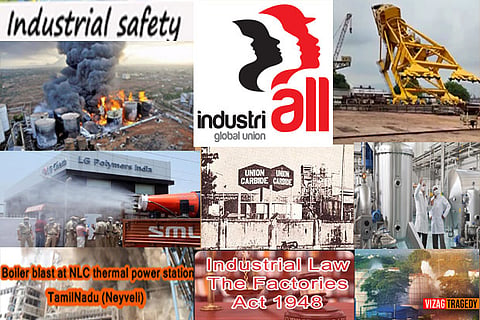

Chennai
The incident follows close on the heels of 12 people losing their lives in May, after inhaling toxic styrene monomer vapour that leaked from the LG Polymers plant in Visakhapatnam.
The history of negligence vis-a-vis worker and public safety has precedents in Tamil Nadu as well – which reported six fatalities and 17 burn injuries last month after a boiler blast that took place at a power plant of NLC in Cuddalore. This was the second such incident at the power plant after a blast in May that injured eight workers. A global union called IndustriALL reported 30 industrial accidents since May 2020 in the country that have killed 75 and injured over 100 people. These developments highlight the sorry situation of industrial safety in India. They assume even greater significance when one considers even more industrial and manufacturing concerns will open as part of Unlock 3.0, with as much as 75 per cent of the workforce being permitted into the companies.
To put the notion of worker safety into context, one must consider the history of industrial mishaps in India, how they have been redressed, and if at all, those responsible have been bought to book. The Bhopal Gas Tragedy of December 1984 is a case in point – a mishap considered among the worst industrial disasters globally, with over 30,000 fatalities to this day. Warren Anderson, the CEO of the Union Carbide Corporation, went scot-free with no accountability to speak of, as the responsibility of running the plant was placed with the management of Union Carbide India Ltd. In 2010, seven Indian employees of the company were convicted for death by negligence and sentenced to two years in prison. But they were all released on bail post the verdict. Over 36 years on, the kin of those affected by the tragedy is still seeking justice.
Activist groups attribute the recent mishaps to the casualisation of the workforce. The hiring of contract workers by companies creates a milieu where the workers are devoid of agency, bargaining power, and compelled into working with the bare minimum safety precautions. Industry observers say handing over of operations of sensitive machinery to inexperienced contract staff also comes with dire consequences. The Vizag gas leak incident was a result of the plant’s operations coming to a halt during the lockdown and the absence of fail-safe mechanisms to detect, prevent chemical reactions that took place during such periods of inactivity.
Taking cognisance of such developments, the Karnataka government had recently decided to reframe its rules concerning industrial inspections, dealing with labour and pollution, as well as laws concerning registration and licences. The state was looking at the option of a central random inspection, under which an inspector is allocated centrally, and the same inspector is not assigned to the same unit in consecutive years. Going forth, it is imperative that both states and the Centre come together to reconsider the provisions of the Factories Amendment Act, 1987, and plug the gaps that allow negligent action to cause wilful damage to life.
It goes without saying that amending the laws and strengthening the execution are just the tipping points to responsible corporate behaviour. What is also needed is a shift in perspective, in terms of how management views its employees – being valuable, as opposed to being expendable.
Visit news.dtnext.in to explore our interactive epaper!
Download the DT Next app for more exciting features!
Click here for iOS
Click here for Android